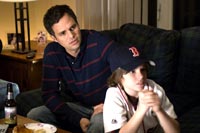This has been the year of the revenge picture. First came the abominable Death Sentence, then the extremely problematic yet far superior The Brave One. Now comes Reservation Road, a film that doesn’t look or feel like those aforementioned thrillers, but deals with the same basic themes, namely tragic loss, grief, rage and the quest for revenge. Too bad it offers nothing more perceptive or discerning than its blood-soaked predecessors.
Reservation Road opens with every parent’s worst fear—the loss of a child. On their way home from an outdoor student concert late in the evening, the Learner family (father Ethan played by Joaquin Phoenix and mother Grace played by Jennifer Connelly) stops at a gas station so daughter Emma (Elle Fanning) can use the facilities. While waiting for his sister, young Josh Learner (Sean Curley) crosses the rural Connecticut road to release some fireflies from a bell jar and is struck and killed by a passing SUV.
The man behind the wheel is Dwight Arno (Mark Ruffalo), who’s racing back from Fenway Park where he and his son Lucas (Eddie Alderson) have just watched the Boston Red Sox secure a spot at the 2004 World Series. He’s going a lot faster than he should because his impatient ex-wife, Ruth (Mira Sorvino) is anxious for her son’s return. Unable to make out what he’s hit, Dwight hesitates for a moment, but, in a panic, he barrels on before his groggy son can make out what happened.

Devastated, the Learners try to come to terms with their loss. Grace blames herself for the death of her son, but must surmount her self-loathing in order to be strong for the rest of her family. Her increasingly estranged husband becomes fixated on the incident and obsessed with achieving justice by any means necessary. Ethan is more interested in retribution than in grieving. While the police search for the SUV turns cold, Ethan scours the Internet for advice on how to conduct his own investigation. While Grace tries to figure out how to live, the increasingly frustrated Ethan contemplates how one might kill.
From this point on, Reservation Road relies on contrived coincidences to energize the plot. When Ethan shows up at a local law firm to hire an attorney to help with his case, he is assigned none other than Dwight himself. Unsuspecting at first, Ethan grows ever more wary the more time he spends with Dwight. For his part, Dwight is an emotional basket case. Far from shrugging off what he has done, Dwight becomes Lady Macbeth, a man unraveling under the strain of his heinous act. Getting away, the film suggests, is not the same as being free. Dwight wants, even tries, to confess, but always wavers at the thought of what such an admission would mean to his uneven relationship with his own son.
Reservation Road is the story of these two fathers—one waylaid by seething fury and the other impotent with remorse. Ultimately, we know that Ethan must figure out that Dwight is his man, a realization that is bound to unleash a potentially devastating confrontation.

Reservation Road is directed by Terry George (Hotel Rwanda). George’s direction is solid and even interesting, with several scenes where the camera gets right in the actors’ faces, disconcertingly close. We are able to chart the cavalcade of emotions just by watching their eyes. And the quintessential New England landscape, resplendent in all its fall glory, is shot with a tourist enticing glow. But what George cannot wring from this turnip is the tension and tautness necessary to agitate his audience, let alone make them care about Ethan’s obsession. If we cannot be persuaded to follow the emotional journey of a grief-stricken man who wants to see his child’s killer punished, than something is dreadfully wrong.
What is perhaps most disappointing is that Reservation Road boasts some of the best performances seen this year. Ruffalo, always masterful, is a shattered man ready to fall to pieces at any moment beneath the weight of his guilt. Phoenix is hollowed out by his sorrow—it is as if his driving need for vengeance is the only thing that gives his corpse-like presence the energy for locomotion. But it is Connelly who hits like a freight train. Her manifestations of anguish are Oscar-caliber. Since the hit-and-run accident takes place within the film’s opening moments, we are asked to mourn for and with the principles long before there is time for us to come to know and care for them. And yet, we do so easily because Connelly and the others’ performances are so authentic and believable. These actors are far too good for this material.
The problem lies with the script. On paper, the story looks strong. In fact, the movie is based on the novel by John Burnham Schwartz, which won the New York Times’ Notable Book of the Year award. Given that Schwartz adapted the screenplay himself, one would think that lightning might just be coaxed into striking twice. Not so.

Reservation Road is a drama with unhealthy aspirations of being a thriller. Although there are no moments where Phoenix takes up arms and initiates blood-soaked carnage—as in the films mentioned at the outset of this review—the script wants to make you think the film could go in that direction at any moment. A thoughtful and intelligent look at the motivations behind revenge and the terrible path to which it leads is bypassed in favor of melodramatic theatrics.
The script relies on lazy manipulation to advance the plot. At several points in the film, Dwight tries to confess to the crime, only to be shrugged aside by authorities supposedly too busy to listen to what he has to say. Furthermore, as Ethan slides deeper into his vengeful quest, his railings on the importance of justice become increasingly heavy-handed. When he finally puts the puzzle pieces together and determines that the man he is after has been right beneath his nose the entire time, the reveal feels forced and conveniently implausible.
The fact that the script is built on such moments, rather than simply trips over them occasionally, transforms a film with tremendous potential into a tremendous dud. There is no catharsis to speak of, no emotional remuneration worth the tedium that precedes it. It might be different if the film took more time at the end to probe the process of how one wrestles with profound loss or how another eschews culpability for causing incalculable agony. However, the film presents no such insight into the psyches of either man.

The story, as it is written, does not allow time nor the breathing room for reality. We are never permitted
to see Ethan or Grace wrestle with the Really Big Questions, the sort that, regardless of religious belief, parents in the midst of such a tragedy are bound to have. We yearn for something. Anything. Where is God in the midst of such heartbreak? Where is, at the very least, the fire-breathing, vitriolic tirade insisting such a tragedy “proves” God does not exist in the first place? That, at the very least, would be understandable.
But instead of grappling with these types of issues, the film instantly shoehorns Ethan into vengeance-seeking mode. While Grace is allowed a few more moments of grief, its scarcity is based on the fact that the script calls for her to manufacture closure almost immediately to keep the family running smoothly in her husband’s emotional absence.
Reservation Road commits to a situation in which we are shown the dangers of demonizing another human being, yet delivers no emotional payoff. How do you see beyond the vilified monster you’ve created in your own mind? What are the end results of giving oneself wholly over to anger and the need for retribution? How do you even begin to grieve or go back to your normal life following a tragedy? These questions are asked, but the film doesn’t care to follow through with any answers.
Talk About It
Discussion starters- The Old Testament speaks of a scale of justice that demands an eye for an eye. Do you feel that such commands are still relevant today, or do you, like Gandhi, feel that such actions blind the entire world? Why or why not?
- What is wrong with demonizing those who have grievously injured us? Do their actions make such characterizations justified, or is there a danger in losing sight of their humanity and value in the sight of God?
- Have you ever gone through such a traumatic experience that it overwhelmed your ability to humanly cope? Were you able to turn to God and find both the solace and strength necessary to carry on? Or did you “shake your fist” at God, dealing with anger and doubt?
- Why are revenge films so popular lately? Are they a reflection of events at home or abroad (or both)? How much more important is the Christian ideal of grace and forgiveness in such times?
The Family Corner
For parents to considerReservation Road is rated R for language and some disturbing images. The “disturbing images” includes a blink-and-you-miss-it car accident in which a child is struck, and a gun-wielding confrontation between the father of that child and his killer; neither is “violence” in the strictest sense, but both are certainly uncomfortable. The film is heavy on language, with numerous instances of the Lord’s name being taken in vain. There is no nudity or sexual situations.
Photos © Copyright Focus Features
Copyright © 2007 Christianity Today. Click for reprint information.












